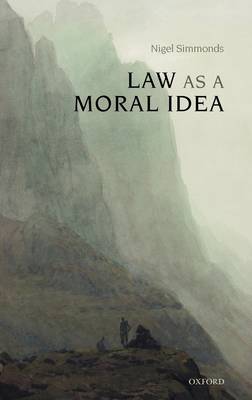
- Retrait gratuit dans votre magasin Club
- 7.000.000 titres dans notre catalogue
- Payer en toute sécurité
- Toujours un magasin près de chez vous
- Retrait gratuit dans votre magasin Club
- 7.000.0000 titres dans notre catalogue
- Payer en toute sécurité
- Toujours un magasin près de chez vous
Description
This book argues that the institutions of law and the structures of legal thought are best understood by referencing the moral ideals of freedom and independence from the power of others. In making this claim, the author rejects the viewpoint of much contemporary legal theory, and seeks to move jurisprudence closer to an older tradition of philosophical reflection upon law, exemplified by Hobbes and Kant. According to most contemporary legal theorists, the understanding and analysis of existing institutions is quite distinct from any enterprise of moral reflection, but Nigel Simmonds suggests that the relationship between ideals and practices is much more intimate than this approach would suggest. In Law as a Moral Ideal he posits that some institutions can be properly understood only when they are viewed as imperfect attempts to realize moral or political ideals, and some ideals can be conceived only by reference to their expression in institutions.
Spécifications
Parties prenantes
- Auteur(s) :
- Editeur:
Contenu
- Nombre de pages :
- 224
- Langue:
- Anglais
Caractéristiques
- EAN:
- 9780199276462
- Date de parution :
- 10-05-07
- Format:
- Livre relié
- Format numérique:
- Genaaid
- Dimensions :
- 164 mm x 241 mm
- Poids :
- 485 g

Les avis
Nous publions uniquement les avis qui respectent les conditions requises. Consultez nos conditions pour les avis.






